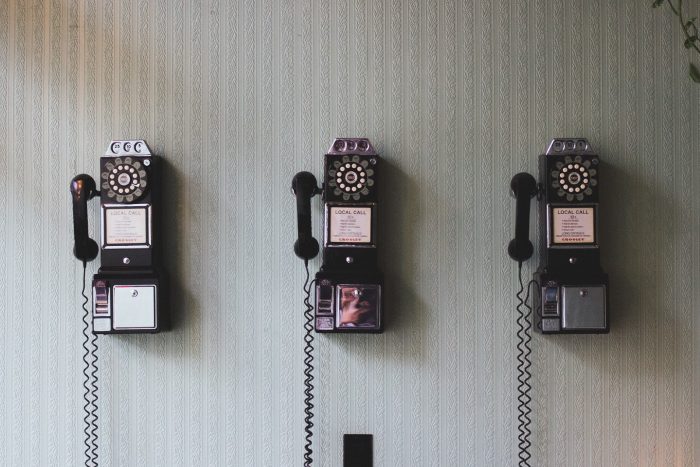Growing your professional network is a great way to grow your personal brand as well as your business. Whether your goal is gaining customers, partners, or employees, a strong network can boost your business’ profile and profits. But as much as networking can benefit your business and career, bad networking will cost you.
While some people revel at the idea of meeting up with like-minded businesspeople, many find the process of professional networking to be, well, awkward. Even if you already know that networking is the next step for growing your small business, you may still be unsure of how exactly you’re supposed to make networking work for you.
To help you get more out of your next networking event, we’ve put together a few tips on how you can make your professional networking efforts feel more authentic—and more effective.

What is a professional network?
Before we jump into the tips, let’s talk about what we mean when we say “professional network”. Strictly speaking, a professional network is made up of individuals connected through career or business-related reasons. This could include the people you work with, the vendors you’ve contracted, the people you work for, or people in the same industry. But not every member of your professional network is so rigidly defined.
People can move from your personal or educational networks into your professional network with the blink of an eye. So while your professional network may look at first glance to include only people in your industry, it’s actually much larger than that—it includes anyone you might cross professional paths with in the future as well. While these tips will apply to professional networking events in particular, they can also apply to any other networking opportunities you might encounter.
Get out of your own head
When it comes to pre-networking event jitters, we’re usually our own worst enemies. No matter how much time you spend putting together your networking outfit or perfecting your business cards, you may find yourself frozen the moment you enter the event. Getting over your discomfort with professional networking begins with one important mindset shift: networking isn’t about you.
Good networking is about others. Yes, your own career is a big part of it, but how your career and connections can be used to benefit the people you’re meeting with is even more important. Whether you’re providing someone with a useful product, profitable partnership, or an interesting job, the more you can give, the more meaningful connections you’ll be able to create—and leverage down the line.
The less you make professional networking about you, the less you’ll be in your own head about it. Of course, making this shift is easier said than done, so it helps to go in with a few strategies to shift your focus away from yourself and onto other attendees. One way you can occupy an anxious mind, while also creating deeper connections is to work on honing your listening skills. Active listening sounds simple, but requires quite a bit of focus to get right—focus that would have otherwise been wasted wondering whether your handshake was too weak or your arrival was too early.
Get your elevator pitch down
Another strategy for staying out of your head during networking events is to adequately prepare for them. Having a set elevator pitch for professional networking will keep you from fixating on how you’ll answer the dreaded “so what do you do?” question. Once you know you have an elevator pitch in your back pocket, you’ll have one less conversation to worry about.
As you go about creating an elevator pitch for yourself or your business, remember to keep it brief. You’ll only have about 30 seconds before your audience’s attention starts waning. Capturing someone’s interest in this short period might sound like a challenge, but even if you have a bit of a boring business, the right story can draw anyone in. If you can fit the ‘what’, ‘why’, ‘how’, and ‘who’ of your brand and business into those 30 seconds, you’re well on your way to a successful interaction.
While you should keep your pitch short and consistent, you should also leave a bit of wiggle room, so you can tailor it to different audiences. The elevator pitch that resonates with potential employees might need to be tweaked for potential employers. Moreover, be ready to answer questions about your elevator pitch as they arise. Having a 30-second pitch ready for professional networking events is great, but only if you can carry the conversation it opens.

Go beyond your networking questions
In addition to preparing an elevator pitch for your next networking event, you should also prepare a set of conversation-starting (and conversation-saving) questions. Like an elevator pitch, these questions give you one less thing to worry about as you enter new conversations with other event attendees.
That said, while you should enter every networking event with a set of questions ready for each person you meet, you shouldn’t spend the whole event reading from a script. Having starter questions to learn about someone’s industry, role, and goals are great, but the conversation shouldn’t stop there. Professional networking is, above all else, a human activity. Getting to know people beyond a set of questions will help you build the kind of relationships that last long after you exchange business cards.
A great way to go beyond your set questions is to delve into people’s responses—and let them talk about themselves. People like talking about themselves, and if you give them an opportunity to do so, they’ll like you too. So, tailor your questions to each person you talk to and let them tell you more about their interests and achievements. This strategy not only generates positive feelings towards you, but also reveals useful skills or connections a person might have.
Choose meaningful networking events
Most networking events don’t take place in a contextless void. They’re usually targeted at a certain industry or prefaced by a presentation on a particular topic. Choosing relevant networking events (rather than just the biggest one) will help you find people with similar interests and businesses—so you can build a meaningful network, rather than just a large one.
By targeting your attendance towards relevant events, you boost your chances of finding the mentors, employees, collaborators, and business partners that will make the biggest impact on your success. Even if you come out of a niche marketing event with fewer business cards than you would a larger event, those few cards are usually more useful down the line.
Go in with goals (but stay flexible)
Going into a networking event with goals will ensure that you get the most out of your professional networking efforts. Whether you have a quarterly goal for new customers you’re hoping to meet or are on the lookout for new talent to bring into your business, going in with goals will structure your interactions and keep you focused.
That said, your goals shouldn’t limit your professional networking activities. If you aren’t hiring new employees right now, but meet someone that could be a great fit, don’t dismiss it as “not part of the plan”. Thinking long-term—as well as short-term—as you build your professional network will ensure you get a better ROI from your networking activities. By building these relationships today and nurturing them until you’re ready, you can maximize your long-term networking payoff.

Give more than you take
As we mentioned when we first started, professional networking isn’t about you—it’s about other people. If you want your networking to feel authentic, you need to keep that in mind constantly. The more you give in your professional networking, the more you’ll get out of it long-term.
So, as you prepare to attend your next professional networking event, ask yourself, “What can I do to make this event better for others?” You might be surprised by what you get in return.
Find a Home-Based Business to Start-Up >>> Hundreds of Business Listings.















































